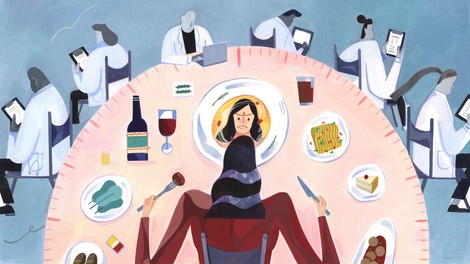Your podcast discovery platform
Curious minds select the most fascinating podcasts from around the world. Discover hand-piqd audio recommendations on your favorite topics.

piqer for: Global finds Health and Sanity Doing Good
Bangalore-based Rashmi Vasudeva's journalism has appeared in many Indian and international publications over the past decade. A features writer with over nine years of experience heading a health and fitness supplement in a mainstream Indian newspaper, her niche areas include health, wellness, fitness, food, nutrition and Indian classical Arts.
Her articles have appeared in various publications including Mint-Wall Street Journal, The Hindu, Deccan Herald (mainstream South Indian newspaper), Smart Life (Health magazine from the Malayala Manorama Group of publications), YourStory (India's media technology platform for entrepreneurs), Avantika (a noir arts and theatre magazine), ZDF (a German public broadcasting company) and others.
In 2006, she was awarded the British Print-Chevening scholarship to pursue a short-term course in new-age journalism at the University of Westminster, U.K. With a double Masters in Globalisation and Media Studies from Aarhus Universitet (Denmark), University of Amsterdam and Swansea University in Wales, U.K., she has also dabbled in academics, travel writing and socio-cultural studies. Mother to a frisky toddler, she hums 'wheels on the bus' while working and keeps a beady eye on the aforementioned toddler's antics.
A Closer Look At How We See Eating Disorders
Eating disorders have always been tricky - to diagnose, treat and to experience. The statistics are also starkly American. If you go by the numbers, you'd think the rest of the world has not heard of overeating due to anxiety or purging after having an extra piece of cake. Misleading and lazy journalism has stamped this image into the public consciousness of bone-thin models or morbidly obese women unable to get off their beds. A false and dangerous perception has been built that one cannot have an eating disorder if one looks reasonably fat.
This is precisely why this searing personal narrative of a young woman's war with her weight reads so true. She shares how even her own physician could not see the signs, and even complimented her on her 'weight loss' without any suspicion of her countless post-meal purges or her obsession with the scale. Her friends on Instagram did the same. Comments were full of praise, congratulations and even envy for her weight loss. The young woman, Giardino, questions these "pervasive stereotypes" that make us laud a chubby girl for rapidly losing weight, where, if she'd been smaller and losing weight as quickly, she would have been referred for treatment. She asks: where is the line?
Her case is just one example of how problematic it is to identify 'almost’ eating disorders and their crucial link to mental health. Her narrative raises two other vital questions about treating eating disorders, including:
1. The frequently-used Body Mass Index (BMI) mandates that a patient must have a body weight less than 85% of what is expected to be clinically anorexic. This leaves out a whole lot of individuals who might be suffering from mild to medium anorexia.
2. The confusing and rigid diagnostic categories (see story for details) for treating eating disorders is hardening stereotypes and reducing chances of identification.
